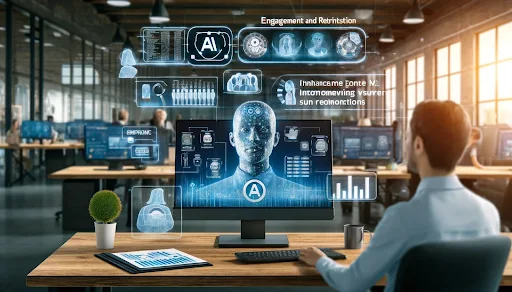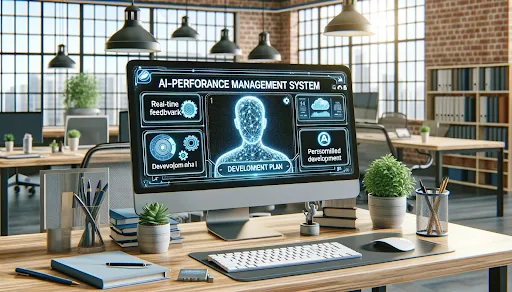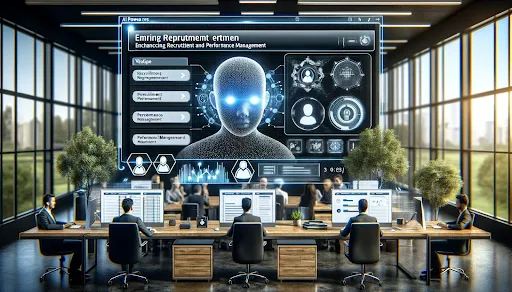Artificial Intelligence (AI) is transforming Human Resources (HR) by enhancing recruitment processes, improving employee retention, and optimizing workforce management. This blog post explores the role of AI in HR, examining its applications, benefits, challenges, and future trends. Our target audience includes students, HR professionals, and business leaders, particularly those from the US, who are keen to stay updated with the latest in AI and HR technology.
Understanding AI in Human Resources
AI in HR involves the use of intelligent algorithms to streamline recruitment, enhance employee management, and improve overall HR efficiency. These AI systems support HR professionals in managing talent, optimizing HR processes, and enhancing employee experiences.
AI HR Applications
1. Recruitment and Talent Acquisition
AI enhances recruitment by automating candidate sourcing, screening, and matching processes. AI-driven systems can analyze resumes, identify the best candidates, and reduce the time-to-hire, improving the overall efficiency of talent acquisition.
Image Prompt: AI-powered recruitment system analyzing resumes and matching candidates to job openings.
Alt Description: AI-driven recruitment platform streamlining candidate sourcing and matching processes.
2. Employee Onboarding
AI improves employee onboarding by automating administrative tasks, providing personalized training programs, and offering real-time support. This enhances the onboarding experience and ensures that new hires are well-integrated into the organization.
Image Prompt: AI-powered onboarding system providing personalized training and support to new employees.
Alt Description: AI-driven onboarding platform enhancing the new hire experience with personalized training.
3. Employee Engagement and Retention
AI supports employee engagement and retention by analyzing employee data to identify trends, predict turnover risks, and provide targeted interventions. AI-driven HR systems can help organizations retain valuable talent and improve overall employee satisfaction.
Image Prompt: AI system analyzing employee data to improve engagement and retention strategies.
Alt Description: AI-powered HR platform enhancing employee engagement and retention through data analysis.
4. Performance Management
AI enhances performance management by providing real-time feedback, identifying skill gaps, and offering personalized development plans. AI-driven systems can help employees improve their performance and achieve their career goals.
Image Prompt: AI-powered performance management system providing real-time feedback and development plans.
Alt Description: AI-driven performance management platform offering feedback and personalized development.
5. Workforce Analytics
AI improves workforce analytics by analyzing data to provide insights into employee productivity, engagement, and well-being. These insights help HR professionals make data-driven decisions and optimize workforce management strategies.
Image Prompt: AI system analyzing workforce data to provide insights into productivity and engagement.
Alt Description: AI-powered workforce analytics platform offering insights for data-driven HR decisions.
Benefits of AI in Human Resources
1. Enhanced Recruitment Efficiency
AI improves recruitment efficiency by automating repetitive tasks, reducing the time-to-hire, and ensuring that the best candidates are identified. This helps organizations attract top talent and fill positions more quickly.
2. Improved Employee Experience
AI enhances the employee experience by providing personalized support, automating administrative tasks, and offering development opportunities. This leads to higher employee satisfaction and retention.
3. Data-Driven Decision Making
AI provides HR professionals with data-driven insights that support better decision making. This enables organizations to optimize their HR strategies, improve workforce management, and drive business performance.
4. Reduced HR Costs
AI helps reduce HR costs by automating administrative tasks, optimizing recruitment processes, and improving workforce management. This leads to significant cost savings and improved operational efficiency.
5. Better Talent Management
AI enhances talent management by providing insights into employee performance, identifying skill gaps, and offering personalized development plans. This helps organizations retain and develop their valuable talent.
Challenges of AI in Human Resources
1. Data Privacy and Security
The use of AI in HR involves handling sensitive employee data, raising concerns about data privacy and security. Ensuring that data is protected and used ethically is a significant challenge.
2. Integration with Existing Systems
Integrating AI solutions with existing HR systems and infrastructure can be complex and costly. Businesses need to invest in compatible technologies and training for successful integration.
3. Skill Gaps
The adoption of AI in HR requires professionals to be trained in using AI tools and understanding their implications. Bridging the skill gap is essential for effective implementation.
4. High Costs
Developing and implementing AI solutions can be expensive, particularly for small and medium-sized enterprises. The high costs of AI technology and infrastructure need to be managed carefully.
5. Ethical Considerations
The use of AI in HR raises ethical questions about data ownership, transparency, and the potential for bias in AI algorithms. Ensuring that AI systems are designed and used ethically is crucial to their success.
Case Studies: AI in Human Resources
1. IBM Watson
IBM Watson uses AI to enhance recruitment, onboarding, and employee engagement. AI-driven solutions help IBM identify the best candidates, streamline onboarding processes, and improve employee satisfaction.
Image Prompt: IBM Watson's AI-powered HR system enhancing recruitment and onboarding processes.
Alt Description: AI-driven IBM Watson improving HR processes with recruitment and onboarding enhancements.
2. LinkedIn Talent Solutions
LinkedIn Talent Solutions leverages AI to improve talent acquisition, provide personalized job recommendations, and enhance candidate engagement. AI-driven tools help businesses attract and retain top talent.
Image Prompt: LinkedIn's AI-powered talent acquisition system providing job recommendations and enhancing candidate engagement.
Alt Description: AI-driven LinkedIn Talent Solutions enhancing talent acquisition with job recommendations.
3. Workday
Workday uses AI to improve workforce planning, talent management, and employee engagement. AI-driven insights help businesses optimize their HR strategies and improve overall employee experiences.
Image Prompt: Workday's AI-powered HR system providing workforce planning and talent management insights.
Alt Description: AI-driven Workday enhancing HR processes with workforce planning and talent management.
4. SAP SuccessFactors
SAP SuccessFactors leverages AI to enhance recruitment, performance management, and employee development. AI-driven tools help businesses identify high-potential employees and provide personalized development plans.
Image Prompt: SAP SuccessFactors' AI-powered HR system enhancing recruitment and performance management.
Alt Description: AI-driven SAP SuccessFactors improving HR processes with recruitment and development enhancements.
5. Oracle HCM Cloud
Oracle HCM Cloud uses AI to improve talent acquisition, workforce management, and employee engagement. AI-driven solutions help businesses optimize HR processes and enhance employee experiences.
Image Prompt: Oracle HCM Cloud's AI-powered HR system enhancing talent acquisition and workforce management.
Alt Description: AI-driven Oracle HCM Cloud improving HR processes with talent acquisition and management enhancements.
The Future of AI in Human Resources
The future of AI in HR is promising, with continuous advancements expected to further enhance recruitment, employee management, and workforce optimization. Here are some future trends to watch for:
1. AI-Powered Predictive Analytics
Future AI systems will provide more advanced predictive analytics, allowing HR professionals to anticipate workforce trends, identify potential issues, and make proactive decisions. This will improve HR planning and strategy.
2. Enhanced Employee Experience Platforms
AI will drive the development of more sophisticated employee experience platforms that provide personalized support, career development opportunities, and well-being programs. This will enhance employee satisfaction and retention.
3. AI in Diversity and Inclusion
AI will play a significant role in promoting diversity and inclusion by identifying biases in hiring processes, providing unbiased candidate recommendations, and ensuring equitable HR practices. This will help organizations build more diverse and inclusive workforces.
4. Integration with Emerging Technologies
AI in HR will increasingly integrate with other emerging technologies, such as blockchain for secure data management, IoT for employee wellness monitoring, and VR/AR for immersive training experiences. This will enhance the capabilities of HR systems.
5. Ethical AI Development
Future AI systems will be developed with a greater emphasis on ethics and transparency, ensuring that AI-driven HR processes are fair, unbiased, and accountable. This will build trust among employees and stakeholders.
Conclusion
The integration of AI in Human Resources is transforming the way businesses manage talent, optimize HR processes, and enhance employee experiences. While there are challenges to overcome, such as data privacy, integration issues, and ethical considerations, the benefits of AI in HR are substantial. As AI technologies continue to evolve, they hold the potential to create more intelligent, efficient, and employee-centric HR systems. By understanding the applications, benefits, and challenges of AI in HR, stakeholders can leverage these technologies to drive growth and innovation in their human resources strategies.
SEO Keywords: AI human resources, AI recruitment, AI HR
technology, AI HR applications, AI hiring, AI employee management, AI HR
solutions, AI HR trends, AI HR benefits, AI HR tools, AI HR industry,
AI talent acquisition, AI HR innovation, AI HR examples, AI employee
retention, AI HR development, AI HR impact, AI HR future, AI workforce
management, AI HR projects.











Comments
Post a Comment